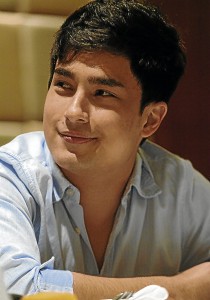
NOT just for the looks, Marlon Stöckinger is touted to be the brightest driving talent to emerge from the Philippines in two decades.
His killer looks have the potential to set commercial endorsement contracts racing to his doorstep. His driving skills can leave others eating his dust. He certainly has what it takes to make a name for himself on the tracks and in the tube. Right now, however, he has stayed the course—that is, collecting wins on the racetrack. Marlon San Pedro Stöckinger, just 20 summers young, has become the first Filipino to win a Formula race in Europe. And he has all motor racing enthusiasts in this part of the world buzzing: Is he “The One”?
There already is a pile of published material on this handsome Filipino-Swiss driver. We know that he was born and raised in the Philippines. His Swiss father is businessman and racing fanatic Tom Stöckinger, his mother Egin San Pedro. His career, now being managed by the principal of the F1 Lotus-Renault team, seems most likely headed to F1, and if that happens, Marlon would be the first Filipino to make it to F1.
That much, Automobile Association Philippines motor sports committee chairman Mandy Eduque has also said, as he added that Marlon would now have a “direct path” to F1 if he does well.
“He is in his second season in GP3. His next step will be GP2 or F3. Then it will be F1, depending on his performance,” Eduque told Inquirer Motoring.
There are still many, many chequered flags to conquer before Marlon can reach the highest levels of motorsport. And that would most probably mean that we won’t be seeing Marlon that often without his helmet and racing suit on.
In fact, as of press time, Marlon’s uncle, Eric J. San Pedro, disclosed that the young racer was in transit to Estoril in Portugal for a three-day test to make him acquainted with the car and the team (it is for the GP3 as Marlon is a junior formula race car driver).
Last Friday, the Inquirer came out with the AAP special advertising feature that featured Stöckinger joining the top-ranking GP3 Team. The feature revealed that Stöckinger had agreed to join the Silverstone, UK-based Status Grand Prix for 2012 as he embarked on his second season in the GP3 Series.
The news release dubbed him as the brightest driving talent to emerge from the Philippines in two decades, and said that Stöckinger returns to the Formula One support series after a strong end-of-season testing campaign with Status GP last autumn.
Stöckinger regularly finished among the Top 5 of the time sheets in Barcelona, Valencia and Jerez and impressed the team with his approach and feedback.
Status GP carries the second-highest win tally since the category began in 2010. In the 2011 GP3 Series, Status scored victories with two drivers. The 2012 GP3 Series will be fought out at eight Formula One Grand Prix races across Europe, including the new addition of a round at the Monaco Grand Prix. Drivers will be competing for a new prize from tire supplier Pirelli, which provides the GP3 champion with a 200,000-euro reward toward a GP2 Series drive.
Stöckinger was formerly a Formula BMW scholar and race-winner in Formula Renault UK. Of Stöckinger joining Status GP, Eduque said that he would now be with a better team this year.
2BU interview
Three months ago, in November 2011, Inquirer 2BU came out with an exclusive story on Marlon. The story revealed Marlon’s educational background in the Philippines. It was when he moved to Europe that he decided to throw himself wholeheartedly into the intensive training required of a professional racer. “I told my dad firmly, I wanted to focus on one thing—and that’s racing,” he said in the story.
Marlon said he was thrust early into the rigors of motorsport, which provided him a different kind of education. “In school, you always learn from the adults, those older and more knowledgeable than you,” he said.
“I knew that if I wanted to be good at what I’m doing and gain respect for it, I’d have to develop a very professional working attitude, and be able to form relationships with the older people mentoring me,” he said in the 2BU interview.
In the story, Marlon also credited his older, more seasoned teammates for broadening his perspective and helping him adjust to cultural differences. “Be more liberated,” he said unhesitatingly. “Take more responsibility, be open, and have your own opinion.”
Marlon also said that by being immersed in this kind of sport, where teamwork plays a huge factor in one’s victory, Marlon acknowledges the value of contributing his inputs and having his thoughts heard.
He told 2BU: “The conservative nature of Filipino culture and our strict religious background generally make Filipinos more reluctant to speak out.”
“But thanks to racing, I now know how to speak my mind in a professional and respectful manner and offer constructive criticism, all of which make us grow as a team. However, it’s also this very upbringing that has enabled me to relate well to my teammates.”
Marlon often reminds himself, while he gears up and prepares for a race, that he’s accountable for his own choices on the track. “Apart from the fact that moving to Europe forced me to learn a whole new culture and be responsible for myself, getting into the sport taught me a lot more—that once the race begins, I’m alone in the game. I have to be entirely liable for my actions, and I have to be aware of the consequences of whatever I do,” he told 2BU.
And when he eventually does join Formula One, he won’t be just “alone” in the game, but the only Pinoy in it.